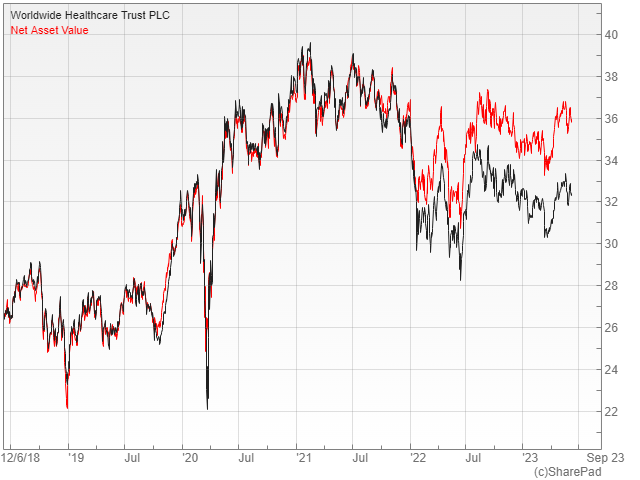Buying Opportunity For The Worldwide Healthcare Trust

It has been a volatile period for the healthcare and biotechnology sector, yet the Worldwide Healthcare Trust (LON: WWH), which provides a broad exposure to this area, has survived almost unscathed. In its annual accounts to the end of March the £2.3bn fund reported an NAV total return of -0.1% compared to a 2.5% gain by the MSCI World Health Care benchmark.
WWH is run by the specialists at OrbiMed Capital, who look for undervalued companies with strong product pipelines, high quality management teams and a robust financial position. Their medical experts research the likely outcomes of clinical trials and regulatory approvals, which have historically been the key driver of share price moves in the sector.
The broker Numis says that Worldwide Healthcare has been on their recommended list since 2012 and it remains their favoured vehicle for diversified exposure to this part of the market. It has a solid long-term track record through stock-picking and has typically been less volatile than most of the listed peer group.
From the trust’s inception in 1995 to the end of March 2023, the compound annual NAV total return per share was 14.5%, compared to 11.9% by the benchmark. The performance in the last couple of years hasn’t been anywhere near as impressive, although the board blames the changing macro-economic conditions rather than the fundamentals of the businesses they invest in.
The Underlying Portfolio
At the end of April, the portfolio consisted of 61 holdings and was well diversified by sub-sector, with the largest weightings being pharmaceuticals 28.8%, healthcare equipment/supplies 19.8%, healthcare providers/services 19% and biotechnology 18.9%. It is more concentrated at the stock level with the 10 largest positions accounting for 43.5% of the assets with names such as AstraZeneca, Intuitive Surgical and Boston Scientific.
One of the things that differentiates it from the handful of other funds operating in this area is the investment in emerging biotech companies that are typically smaller in size. This key strategic overweight has been a hindrance to performance in recent years, but the managers believe that these businesses benefit from higher levels of innovation and growth.
It is the Board’s policy to buy back shares whenever the discount to NAV exceeds six percent on an ongoing basis, although it is possible for the figure to exceed this when sentiment is poor. This has been the case in recent months, with investors currently able to pick up the shares at a 10% discount.
Positive Outlook
The managers highlight several positive developments in the sector, including an upturn in FDA drug approvals. The Inflation Reduction Act, which was approved last year, was also beneficial as it has settled concerns about prescription drug reforms that had been hanging over the various stocks.
OrbiMed think that the M&A activity will continue, with large pharmaceuticals needing to fill their pipelines and replace revenues from drugs with upcoming patent expiries. Mergers & Acquisitions typically signal an inflection point for the sector and the number of these transactions is expected to accelerate given the cheap valuations and the pace of innovation.
Numis says that the sharp sell-off in biotech stocks more than factors in the risks facing this part of the market, which is why they believe it is now a compelling time to invest. Anyone thinking of doing so needs to be comfortable that the long-term potential justifies the higher volatility of this sector-specific fund.

Comments (0)